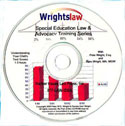In This Issue . . .
Circulation: 71,821
ISSN: 1538-320 |
Here's a top 5 list designed to help our readers find important information quickly and easily. Learn what articles others are reading on topics getting the most attention.
In this issue of the Special Ed Advocate you'll find links to the top 5 articles during the last six months, including your Wrightslaw Game Plan for SMART IEPs.
Remember, you can always read previous issues of the Special Ed Advocate in the Newsletter Archives.
Please don't hesitate to forward this issue to other friends, families, or colleagues.
Not a subscriber? Sign up free today! |
| |
|

|
Tests and Measurements for the Parent, Teacher, Advocate & Attorney
To successfully advocate for your child, you must learn about tests and measurements.
As you read Tests & Measurements, you will learn what tests and evaluations measure, how this information is reported, and how to use information from tests to measure and monitor academic progress. You will also learn how to use graphs to visually demonstrate your child's progress or lack of educational progress in a powerful and compelling manner. |
| |
|
|
|
Functional Behavioral Assessments: What, Why, When, Where, and Who?
"Time is precious. Time should not be wasted on interventions (behavioral or otherwise) when there is no evidence that this particular intervention is likely to work, for this particular child, in this particular situation."
If you are confused about discipline, Functional Behavioral Assessments will help you sort things out. Dr. Stephen Starin describes problem behaviors, functional behavior assessments, environmental manipulation, and qualifications and training of evaluators. |
| |
|
|
|
Response to Intervention: Guidelines for Parents & Practitioners
Dr. James Hale, Associate Professor of School Psychology, describes another new buzzword in the field of education - "Response to Intervention."
He explains what RTI is, what it means for helping children learn, and how it can be used to identify children with specific learning disabilities." |
| |
|
|
|
IEPs for Children with Behavior Problems
IDEA 2004, federal regulations, and commentary describe what IEP teams must do when a child's behavior "impedes the child's learning or the learning of other children." Do not assume that your child's IEP team is knowledgeable about these requirements.
To learn what the law requires IEP teams to do when children with disabilities have behavior problems, read IEPs for Children with Behavior Problems by Pat Howey. |
| |
|
|
|
Wrightslaw Game Plan: SMART IEPs by Pete & Pam Wright
What makes writing IEPs so difficult?
What makes the IEP process so confusing?
How can you get SMART goals in your child's IEP? What can you do if the school wants to use "teacher observations," not objective testing in the IEP?
Here is your IEP game plan... |
| |
back to the top |
| |
|
|





